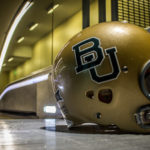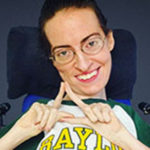WACO—A Baylor University scholar has translated the New Testament from the primary language Jesus spoke into the common language of 21st century Arabic-speaking people.
Abdul-Massih Saadi, a lecturer in Arabic at Baylor, said his 12-year undertaking has been "a good struggle" to translate the text from Syriac Aramaic into two versions—Modern Standard Arabic and Mardini, a colloquial Arabic dialect—in the volume.

Abdul-Massih Saadi, a lecturer in Arabic at Baylor and New Testament translator, consults with Hanna Kermiz, a monk at St. Gabriel Monastery in southeast Turkey. (PHOTO/Courtesy of Abdul-Massih Saadi)
|
The 800-page project by Saadi, a former monk/civil engineer/business manager, meant not only poring over original texts, but also holding the colloquial Arabic version up for scrutiny by people ranging from educated to illiterate to be certain it meshed with the language they speak and understand—including idioms.
"Our translation is the first Arabic Bible based on Eastern Bible tradition, namely the Syriac," said Saadi, who is from Aleppo, Syria. "Most unique in this project is the Colloquial Arabic Version."
The term Syriac refers to one Aramaic dialect in which Christian literature was written. Evidence from the second century A.D. indicates Aramaic-speaking Christians undertook translating the Hebrew Bible and the Greek New Testament into Syriac, he said.
"The Syriac translation of the Greek New Testament restores many of Jesus' expressions in the language he spoke," Saadi said. "The Lord's Prayer, for instance, is as close as it possibly can be to the very words of Jesus himself. It is natural to think that those early Aramaic-speaking Christians had memorized the Lord's Prayer in its original form and that the translators wrote their memorized Aramaic version as they were consulting the written version in Greek."
Aramaic is "still a living language in Syria, Turkey and Iraq. Many Christian families there, including my wife's family and mine, speak it as their first language. There are even Muslims and Jews who speak it as their first language," Saadi said.
Translating, done with the help of his mother and brother, was "a learning process and struggle toward understanding both obvious and hidden meaning of the original text in forms of poetical devices or local idioms, then transferring these same meanings in clear expressions, carrying modern poetical devices and modern local idioms when it was feasible," Saadi said.
Sign up for our weekly edition and get all our headlines in your inbox on Thursdays

Abdul-Massih Saadi with his new Arabic translation.
|
"We invested considerable time to check the whole translation with Mardini speakers. After reading a passage to a group of them, we asked them to repeat or comment on that passage. Their response was valuable for checking the accuracy and naturalness of the translation."
His mission stemmed in part from his first name—Abdul-Massih—translated as "the Servant of the Messiah," he said.
"For many in the Middle East, the name is not merely identification but rather identity and responsibility. Even in my childhood, when I used to do something wrong, people would reproach me saying, 'Either change your behavior or change your name.'"
He joined a monastic order at age 12 and spent 20 years there. He holds degrees in civil engineering, business management, theology and Eastern Christianity, and New Testament studies. He said that in 2002, God called him to marry and raise a family, and he has two sons. He taught at the University of Notre Dame before going to Baylor.
"It would be very difficult to over-emphasize the scholarly and spiritual significance of this," said Heidi Bostic, chair of the department of modern and foreign languages in Baylor's College of Arts & Sciences. "Dr. Saadi's scholarly work, and indeed his own life story, highlight the significance of Arabic-speaking Christians around the world."
His painstaking and lengthy scholarly journey was a spiritual one as well, Saadi said.
"What is more blessed than dealing with God's word with family and friends in God's world?" he asked. "God was the first translator of his word to the world in an easy, natural, accurate and communicative way."














We seek to connect God’s story and God’s people around the world. To learn more about God’s story, click here.
Send comments and feedback to Eric Black, our editor. For comments to be published, please specify “letter to the editor.” Maximum length for publication is 300 words.